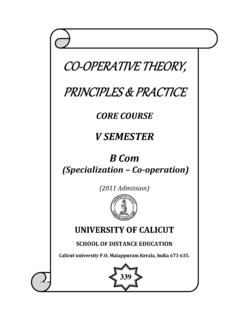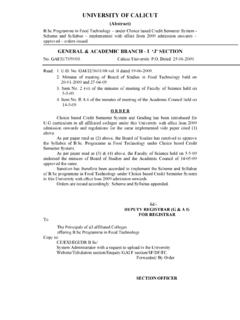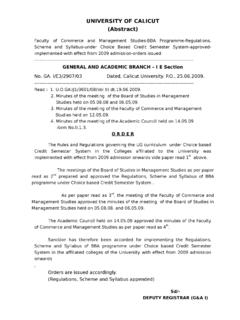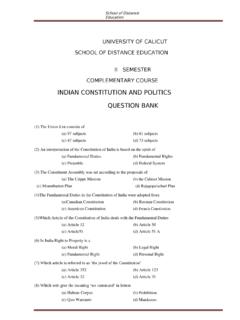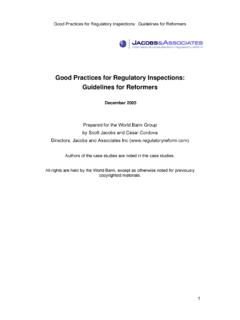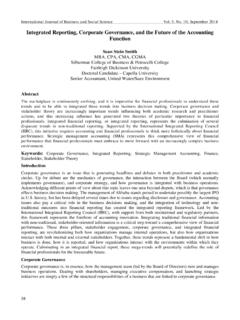Transcription of School of Distance Education
1 FINANCIAL MANAGEMENTBBA(IV SemesterCore Course) (V Semester Specialisation- finance )2011 Admission onwardsUNIVERSITY OF CALICUTSCHOOL OF Distance EDUCATIONCALICUT , MALAPPURAM,KERALA,INDIA 673 635311 School of Distance EducationFinancial ManagementPage2 UNIVERSITY OF CALICUTSCHOOL OF Distance EDUCATIONSTUDY MATERIALBBA (IV Semester Core Course) (V Semester Specialisation- finance )2011 AdmissionFINANCIAL MANAGEMENTP repared by:Ratheesh K. Nair,Assistant Professor,Govt College ,Associate Professor,Department ofCommerce,Govt. College & SettingsComputer Section, SDE ReservedSchool of Distance EducationFinancial ManagementPage3 CONTENTSMODULE ISCOPE AND OBJECTIVE OF FINANCIALMANAGEMENT05 11 MODULE IIINVESTMENT DECISION12 22 MODULE IIIFINANCING DECISION23 49 MODULE IVDIVIDEND DECISION50 64 MODULE VWORKING CAPITAL MANAGEMENT65 82 School of Distance EducationFinancial ManagementPage4 School of Distance EducationFinancial ManagementPage5 MODULEISCOPE AND OBJECTIVE OF FINANCIALMANAGEMENTINTRODUCTIONF inance is called The science of money.
2 It studies the principles and the methods ofobtaining, control of money from those who have saved it, and of administering it by those intowhose control it passes. It is the process of conversion of accumulated funds to productive management is the science of money management .It is that managerial activity which isconcerned with planning and controlling of the firms financial resources. In other words it isconcerned withacquiring, financing and managing assets to accomplish the overall goal of abusiness , DEFINITION AND NATURE OF FINANCIAL MANAGEMENT:Meaning and DefinitionFinancial management is that managerial activity which is concerned with the planning andcontrolling of the firm s financial resources. In other words it is concerned with acquiring,financing and managing assets to accomplish the overall goal of a business enterprise (mainly tomaximise the shareholder s wealth).
3 Financial management is concerned with the efficient use of an important economicresource, namely capital funds -Solomon Ezra & J. John Pringle. Financial management is the operational activity of a business that is responsible forobtaining and effectively utilizing the funds necessary for efficient business operations Financial Management is concerned with managerial decisions that result in theacquisition and financing oflong-term and short-term credits of the firm. As such it deals with thesituations that require selection of specific assets (or combination of assets), the selection ofspecific liability (or combination of liabilities) as well as the problem of size andgrowth of anenterprise. The analysis of these decisions is based on the expected inflows and outflows of fundsand their effects upon managerialobjectives .-Phillippatus.'Financial Engineering'The creation of new and improved financial products through innovative design orrepackaging of existing financial engineers use various mathematical tools in order to create new investmentstrategies.
4 The new products created by financial engineers can serve as solutions to problemsoras ways to maximize returns from potential investment management of the finances of a business / organisation in order to achieve financialobjectivesTaking a commercial business as the most common organisational structure, the keyobjectives of financial management would be to: School of Distance EducationFinancial ManagementPage6 Create wealth for the business Generate cash, and Provide an adequate return on investment-bearing in mind the risks that the business is takingand the resources are three key elementsto the process of financial management:(1) Financial PlanningManagement need to ensure that enough funding is available at the right time to meet theneeds of the business. In the short term, funding may be needed to invest in equipment and stocks,payemployees the medium and long term, funding may be required for significant additions to the productivecapacity of the business or to make acquisitions.
5 (2) Financial ControlFinancial control is a critically important activity to help the business ensure that the business ismeeting its objectives. Financial control addresses questions such as: Are assets being used efficiently? Are the businesses assets secure? Do management act in the best interest of shareholders and in accordance with business rules?(3) Financial Decision-makingThe key aspects of financial decision-making relate to investment, financing and dividends: Investments must be financed in some way such as selling new shares, borrowing from banksor taking credit from suppliers etc. A key financing decision is whether profits earned by the business should be retained rather thandistributed to shareholders via dividends. If dividends are too high, the business may be starved offunding to reinvest in growing revenues andprofits of Financial Management It is an indispensable organ of business management. Its function is different from accounting function.
6 It is a centralised function. Helpful in decisions of top management. It applicable to all types of concerns. It needs financial planning, control and follow-up. It related with different disciplines like economics, accounting, law, informationtechnology, mathematics of Distance EducationFinancial ManagementPage7 SCOPE AND FUNCTIONS OF FINANCIAL MANAGEMENT:The scope of financial managementhas undergone changes over the years . Until themiddle of this century, its scope was limited to procurement of funds. In the modern times ,thefinancial management includes besides procurement of funds ,the three different kinds of decisionas well namely investment, financing and dividend .Scope and importance of financialmanagement includes- Estimating the total requirements of funds for a given period. Raising funds through various sources, both national and international, keeping in mind thecost effectiveness; Investing the funds in both long term as well as short term capital needs; Funding day-to-day working capital requirements of business; Collecting on time from debtors and paying to creditors on time; Managing funds and treasury operations; Ensuring a satisfactory return to all the stake holders; Paying interest on borrowings; Repaying lenders on due dates; Maximizing the wealth of the shareholders over the long term; Interfacing with the capital markets; Awareness to all the latest developments in the financial markets; Increasing the firm s competitive financial strength in the market.
7 And Adhering to the requirements of corporate above scope of activities can be grouped in to three functions-FUNCTIONS OF FINANCIALMANAGEMENT:The modern approach to the financial management is concerned with the solution of majorproblems like investment financing and dividend decisions of the financial operations of a businessenterprise. Thus, the functions of financial managementcan be broadly classified into three majordecisions, namely:(a) Investment decisions,(b) Financing decisions,(c) Dividend decisions: These decisions relate to the selection of assets in which funds will beinvested by a firm .Funds procured from different sources have to be invested in various kinds ofassets . Long term funds are used in a project for various fixed assets and also for current investment of funds in a project has to be made after careful assessment of the various projectsthrough capital budgeting .A part of long term fund is also to be kept for financing the workingcapital of Distance EducationFinancial decision: These decisions relate to acquiring the optimum finance to meet financialobjectives andseeing that fixed and working capital are effectively managed.
8 It includes sources ofavailable funds and their respective cost ,capital structure, a proper balance between equity anddebt capital. It segregate profit and cash flow, financing decisionsalso call for a good knowledgeof evaluation of decision-These decisions relate to the determination as to how much and howfrequentlycash can be paid out of the profits of an organisation as income for itsowners/shareholders, and theamount to be retained to support the growth of the organisation .Thelevel and regular growth of dividends represent a significant factor in determining a profit makingcompany s market value the value placed on its shares by the stock above three type of decisions are interrelated ,the first two pertaining to any kind oforganisation while the third relates only to profit making organisations, thus it can be seen thatfinancial management is of vital importance at every level of business activity ,from a sole traderto the largest multinational AREAS OF FINANCIAL MANAGEMENT Capital Budgeting Working Capital Management Dividend Policies Acquisitions and Mergers Corporate Taxation Determining Financial Needs Determining Sources of Funds Financial Analysis Optimal Capital Structure Cost Volume Profit Analysis Profit Planning and Control Fixed Assets Management Project Planning and OF FINANCIAL MANAGEMENT :Financial Management as the namesuggests is management of finance .
9 It deals withplanning and mobilization of funds required by the firm. Managing of finance is nothing butmanaging of money. Every activity of an organization is reflected in its financial Managementdeals with activities which have financial implications. Efficient financialmanagement requires the existence of some objectives or goals because judgment as to whether ornot a financial decision is efficient must be made in the light of some objectives. It includes- Profit maximisation and wealth /value maximisation Achieving a higher growth rate. Attaining a large market share. Promoting employee welfare Increasing customer satisfaction. Improve community of Distance EducationFinancial ManagementPage9 Among these, a conflict included in profit maximisation and wealth /value maximisationobjective primary objective of a business is to earn profit; hence the objective of financialmanagement is also profit maximisation.
10 If profit is given undue importance, a number ofproblems can arise, such as- It does not take into account the time pattern of returns. It fails to take into account the social consideration to workers, customers etc. The term profit is vague it conveys a different meaning to different people . totalprofit, rateof profit wealth maximisation business firm maximise its market value ,it implies that businessdecision should seek to increase the net present value of the economic profit of the firm .It is theduty of the finance manager to see that the share holders get good return on the share (EPS-Earning per Share). Hence, the value of the share should increase in the stock wealth maximisation objective is generally in accord with the interest of the variousgroups such as owners, employees to limitation (timing, social consideration etc.) in profit maximisation, in today sreal world situations which is uncertain and multi-period in nature, wealth maximisation is a betterobjective.
